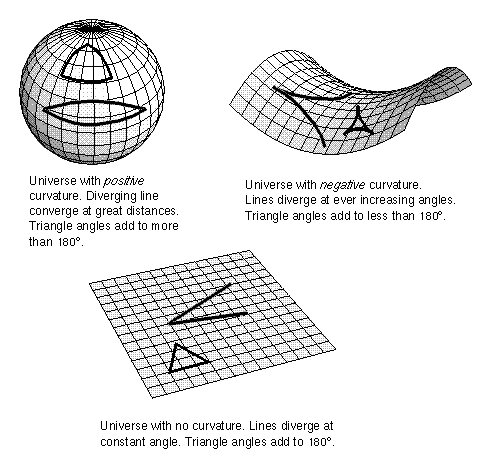Quote:
Originally Posted by Cowperson

To me, the first and second paragraphs contradict the third . . . . . or, at the very least, go beyond the definition of the third.
|
The first and second don't contradict the third because they're talking about different things. The last part is talking about the diameter of the observable universe which is different than the whole universe.
The observable universe is the portion of the universe which we can ever hope to see due to the speed of light. The actual universe appears to be larger, though how much larger who knows.
Quote:
Originally Posted by Cowperson

In the first and second paragraphs, the "universe" is a concept, which could include the argument I've made, that there could be something beyond a boundary.
|
Current models (or at least the ones I'm aware of) don't have any kind of boundary. The surface of a sphere doesn't have a boundary, and neither does an infinite plane, when thinking about the geometry of our universe think of that kind of thing.
Quote:
Originally Posted by Cowperson

The third paragraph seems to make Photon's argument. That there are defined limits, both observed and not observed, to the universe, the universe originating from the single Big Bang we know about. A starting point and a point where it ends, although still expanding.
|
The defined limit on the observable universe is just based on how far we can see based on the speed of light and the amount of time that has passed since the universe started.
As for a limit on the universe itself, a point where it ends, again it's not really necessary or indicated.

If the universe is curved like a sphere, then there's no end point because the surface of a sphere has no end point (remember that for the sphere the surface of the sphere represents all of reality).
In the other two solutions, the universe is infinite spatially.. if you go in one direction you can go in that direction forever and never stop, even if you could travel much faster than the expansion of the universe and faster than the speed of light. So there's still no end point.
Quote:
Originally Posted by Cowperson

The first two paragraphs do leave open the theoretical question of something beyond the results of the Big Bang we know and love.
I think.
Cowperson
|
There's always the possibility, and when talking about the origin of the universe or other universes or the structure of reality there are no really good theories (theory in the scientific sense), but BBT itself and the
Lambda-CDM model are extremely well supported by the observations.

